How Big Is Your World
TU students and faculty broaden their horizons and perspectives with culture-focused study abroad experiences.
Depending on who you ask, it was either Diogenes or Socrates who, when asked where he was from, rather than naming the place of his birth replied, “I am a citizen of the world.”
Regardless of who got there first, in the ensuing 2,400 years, that statement has gone from radical to nearly required. As communication and travel methods have improved, the metaphorical distance between people has shrunk. Having cultural competency—the continuously evolving knowledge of other cultures’ values, norms, traditions and customs—has become a marketable skill and sometimes simply necessary for navigating day-to-day life.
TU has many opportunities for students, faculty and staff to increase their awareness of cultural consciousness, including diversity, inclusion and social justice.
One source is the Study Abroad and Away Office. From its location in Hawkins Hall, it opens the door to the wider world, expanding participants’ perspectives on life in other places and how that coexists with their lives in the U.S.
One of those experiences occurred this past January when College of Liberal Arts professor Jason Freeman took nine students to the north of England on a faculty-led Minimester course called Blacks in Great Britain.
The idea came when Freeman combined his love of travel with his passion for teaching.
“I was teaching a class at TU called Blacks in America,” he says. “It looked at Black culture and history in the United States. The first half was essentially Blacks in Britain because the beginning of slavery in America was in the colonies, but then instead of continuing to study United States history, I wanted to explore what was happening in England at the same time.”
Nearly 74% of TU students who go abroad do so under a faculty-led program, according to the Study Abroad and Away Office. Seniors preparing for the workforce made up 54% of TU students who went abroad last academic year.
Freeman and his students initially were based in Birmingham, a location chosen because Birmingham City University has one of the few Black studies departments in the country. The program included trips to Bristol, Leeds and London. Freeman partnered with Birmingham City professor Martin Glynn to teach lectures on topics like the Windrush Generation (named for the ship that brought more than 1,000 West Indians to England to help the nation rebuild after World War II), the role of sugar cane in the slave trade and the idea of cultural Blackness—who British people consider Black and how that has led to positive and negative results.
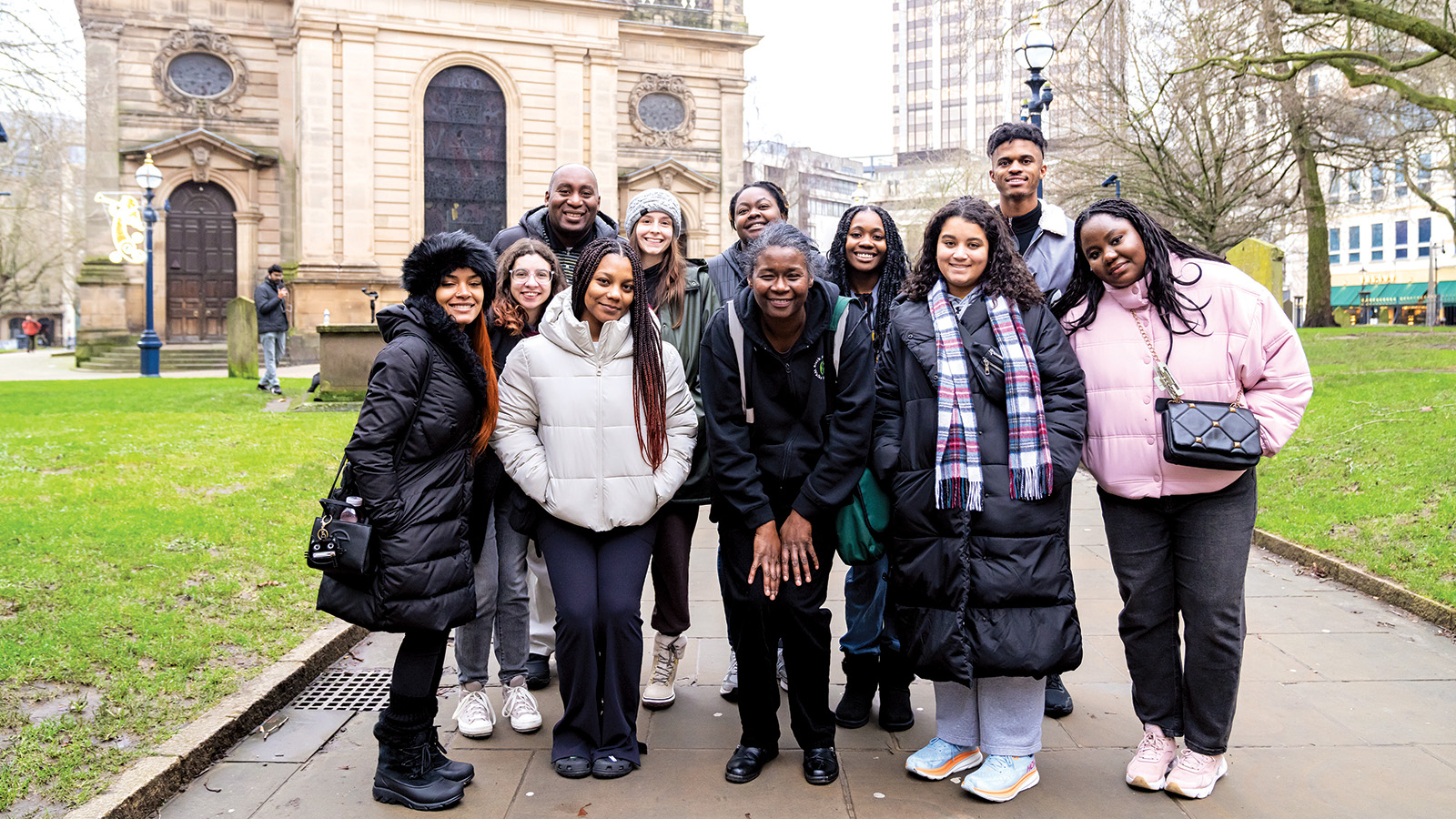
Throughout the two-week experience, professor Jason Freeman (back left) took his students on tours in cities that are important to Black history in Britain. They are pictured here after the Black Heritage Walk in Birmingham, England.
Glynn is an expert on British Black history and cultural contributions in a variety of areas. Most of the students had no grounding in the subject, so what they learned from Glynn and the tour guides on their day trips to Liverpool, Bristol, Leeds and London was remarkable.
“They're familiar with African American history to an extent, but Black British history is totally alien,” Freeman says. “The guides are very blunt sharing what happened. Learning about the shocking brutality brought up deep emotions. But the students were appreciative because they were learning from tour guides they really enjoyed interacting with.”
Arthlynn Jean-Pierre ’24, a sociology and anthropology major with a criminal justice concentration, had never been abroad before. Learning about the Windrush Generation was a new experience for her.
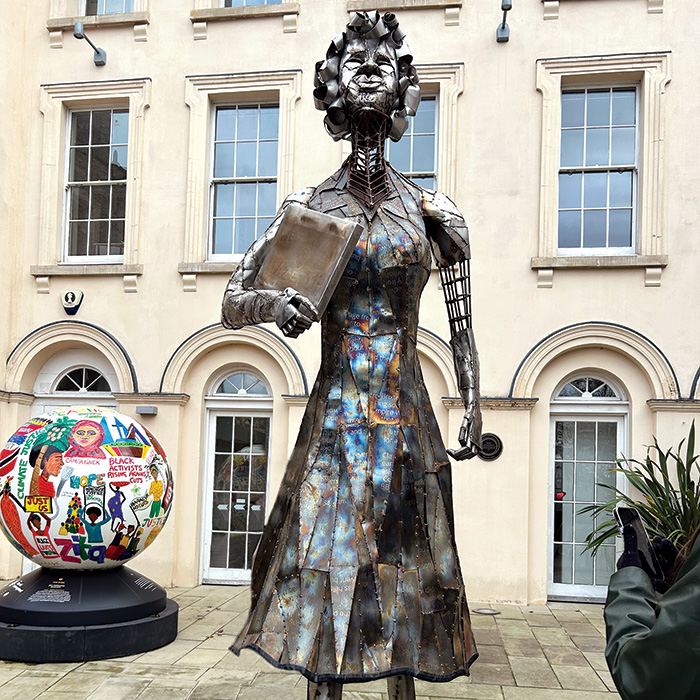
“It was refreshing to learn something that was never taught to us,” she says.
“It was interesting to learn about how people of color weren't always victims of history in a way—that they were also part of forming history as well. The tour guides made the trip 10 times more enjoyable for me. I went on the trip to learn, but meeting new people was really cool.”
Sydney Howard ’25, a political science major, enjoyed hearing about the different, often creative ways enslaved people gained freedom.
“Henry Brown [hid in a crate and shipped himself] from Virginia to Philadelphia and then went to England,” she says. “Another man used his trade skills to buy his freedom. In learning about the individualized paths people took, there was power to that for me. It gave me a new pride to be African American. There’s a lot of discourse about African Americans. But on this trip, I realized we come from resilient people that find community in times of oppression.”
Howard was surprised to learn Black people make up only about 4% of the population in England. It stuck out to her, she says, because she was used to being in majority Black spaces.
“When we went to an English football game, the people in my group were some of the only people of color who weren’t working the game or in the game,” Howard says. “Later we read an article about racism and sport that said how people in the audience have yelled slurs and thrown banana peels at the players. I could never see that happening at a Ravens game.”
Howard also had the opportunity to reflect on social justice issues in the U.S. and U.K. The group visited Bristol to learn about the massive Black Lives Matter protest that occurred there in 2020, when a crowd tore down a statue of Eldridge Colston, a city benefactor whose wealth came from the slave trade, and threw it in the river.
“Social justice issues like Black Lives Matter and police brutality, I tend to look at those as American issues,” Howard says. “But it opened my eyes to the fact that’s not the case at all.”
Some aspects of American culture the students take for granted gets questioned [in other places], like, ‘Why are you doing this? Why is this okay?’ I think it gets them out of their comfort zone, which is where growth happens.
Jason Freeman
At the Black Cultural Archives in London, Howard remembers reading an old copy of a magazine with an article on Britain’s SUS (suspected person) laws. Created in 1824 and revived in the 1960s and ’70s, they allowed police to arrest anyone they deemed suspicious without the burden of proof. They were repealed in 1981.
“Their SUS laws were the equivalent of our stop and frisk laws,” she says. “Despite Black people being less than 4% of the population at the time, they were 80% of the arrests.”
Freeman’s perspective broadened along with his students’.
“I got to know the students a lot more and how they view the world,” Freeman says. “They were born in the late ’90s, early 2000s, so they have a very different experience than me who grew up in the ’80s and ’90s. Some of my knowledge about these topics that I took for granted was eye-opening for them.
“Another thing I learned, particularly in chatting with our tour guides, was how some British people see America. As an American, I have a particular view of my own country. But in many ways, [Britons] are very aware of what’s happening here, and they have a lot of questions as to why we do things in a certain way.”
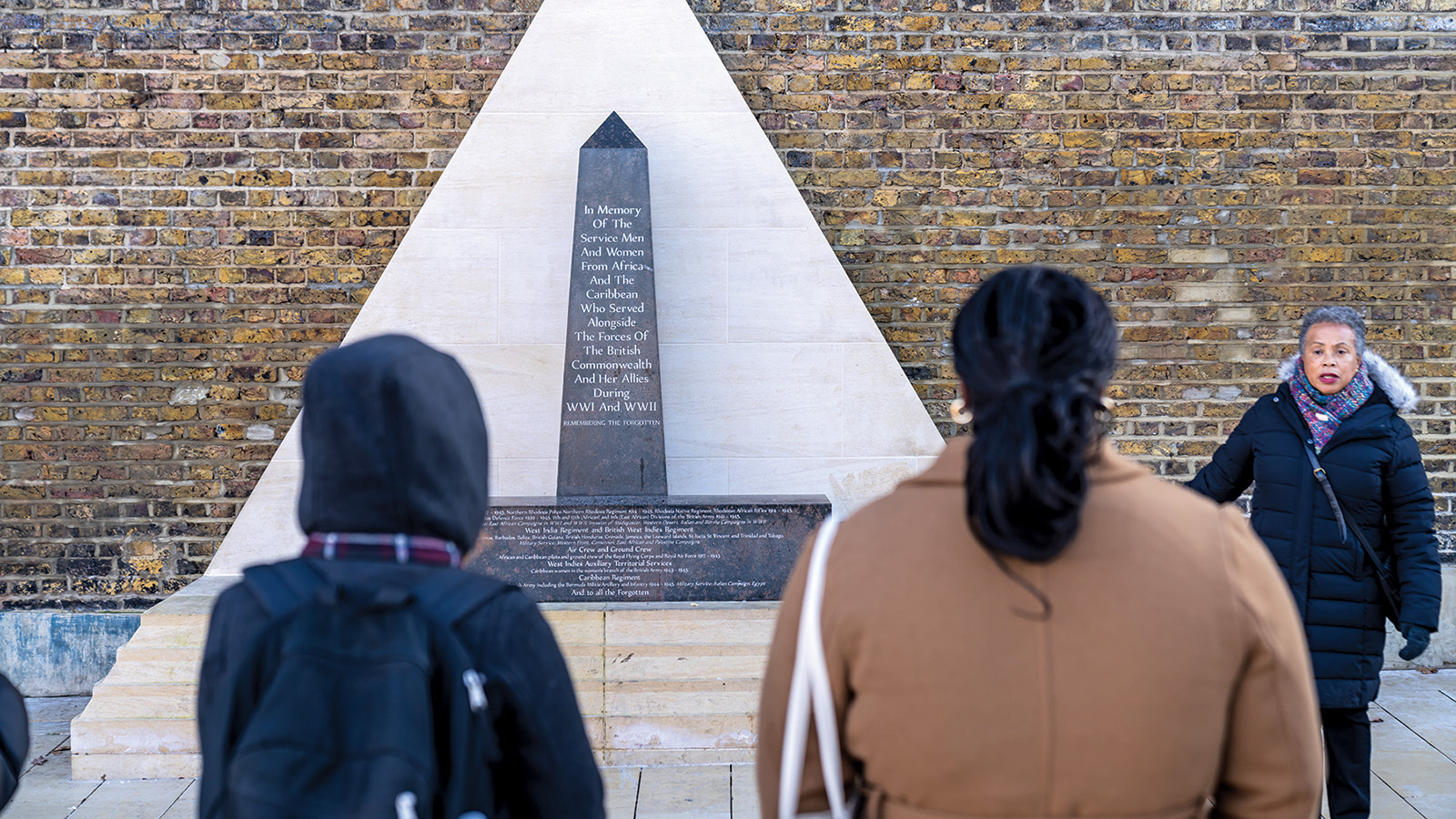
(Left to right) Madison Baltimore and Arthlynn Jean-Pierre are facing tour guide Anne-Marie Walker in Brixton at the African and Caribbean War Memorial located in Windrush Square. The memorial was unveiled in 2017 and is the United Kingdom's national memorial to African and Caribbean service personnel who fought in World War I and World War II.
Not only has Freeman altered the content of his TU-based courses after returning to the U.S., he has made changes to their structure. His connection with Glynn has influenced him to include more interactive class activities and delve into emotions as well as facts in discussions and assignments.
“I do reflection papers in my classes now because I want people to consider their experiences with race, gender, sexuality and topics like that,” he says. “I’m trying to get more of a personal interaction when discussing as a group, which we did a lot during the trip: ‘How do you feel about this? Do you think this is problematic?’”
The study abroad experience affected the students in their own ways.
Howard internalized the resiliency she learned about and is applying it to the challenges she faces as a college student.
“It made me realize there are going to be times when things are hard. But then I recall those stories of how hard people had to fight to get to freedom,” she says. “People have difficult paths that they have to take, so I can apply to internships and hear a couple noes.”
Jean-Pierre has slightly revised her career plans.
I want to be a criminal law attorney. Before the trip I was more focused on the logistics of law, but now I want to develop the social justice side.
Arthlynn Jean-Pierre ’24
“Learning about English slavery laws helped me realize there’s a lot more than what meets the eye with what really happened back then,” she says. “I want to be a criminal law attorney. Before the trip I was more focused on the logistics of law, but now I want to develop the social justice side. There is a quote I heard there that really stuck with me: We’re here because you were there. I think to understand why people can be anti-immigration or anti-people of color is because they don’t understand the consequences of colonization that are playing out now.”
Blacks in Great Britain is not the first culturally focused study abroad TU has offered, and several more are planned for the spring and summer. Topics include diversity and social justice in Irish health care; the nature of ethics, social justice and critical social issues in Thailand’s education system; and social permissiveness in Amsterdam through the links between culture, difference and communication.
Freeman clearly sees the value in study abroad experiences like these.
“For the first time, for a lot of students, they are foreigners in a foreign country where they don’t know all the norms,” he says. “I think it’s an important experience because it fosters empathy, as we have refugees and people all around the world coming to the U.S., and it helped them break down their assumptions. Some aspects of American culture the students take for granted gets questioned [in other places], like, ‘Why are you doing this? Why is this okay?’ I think it gets them out of their comfort zone, which is where growth happens."
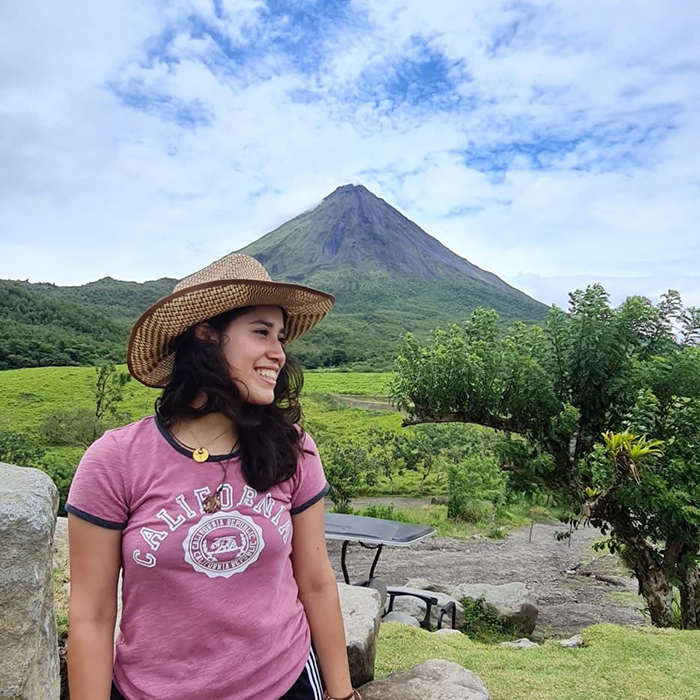
Studying Abroad at TU
Learn how the Study Abroad & Study Away Office helps students broaden their worldviews.
More informationAn American in Paris
Allison Brown ’12 knows the value of her time at TU as an undergraduate, where the business administration major was a member of the Honors College.
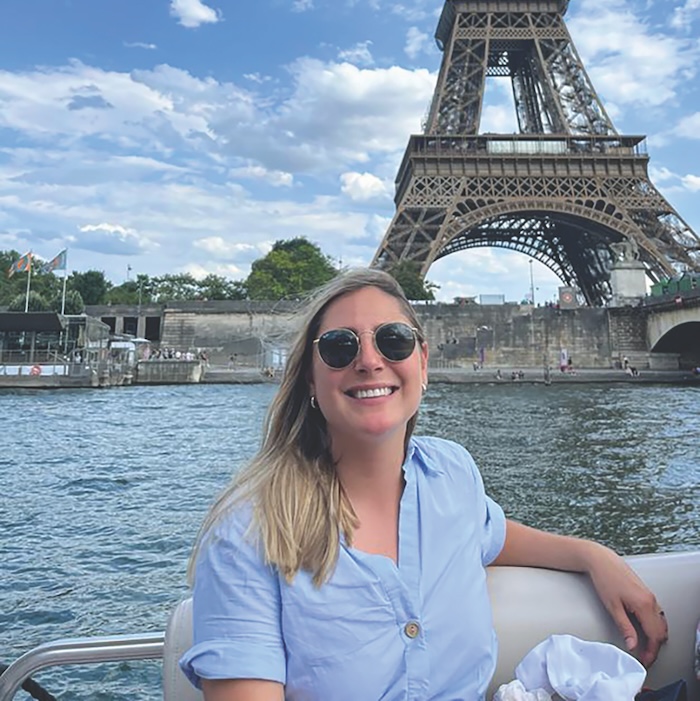
“It set me up for success,” she says. “It was nice to be with people who had the same mindset as me. I also appreciated the faculty and learning about topics like masculinity in literature and the dialogue between Caribbean and English literature around colonialism.”
She knew studying abroad would be a key component of her international business concentration. She chose a semester-long experience at a business school outside Rouen, France. She roomed with a fellow TU exchange student in the city center and plunged into local French culture. They participated in events like a running dinner—where each portion of the meal (drinks, appetizers, entrees and dessert) was held at a different native student’s home—and found the silver lining in transportation strikes by hitching car rides to campus with classmates, making new friends on the commute.
No country is perfect. But I wouldn't have that viewpoint and know there's a different system—whether it's for me or not—without going abroad.”
Allison Brown ’12
Brown’s fellow business students came from all over the world: China, Canada and India in addition to countries all over Europe. She ran into cultural differences almost immediately. From learning what winning at negotiation means in different cultures to receiving very honest critiques on her work from French professors, Brown’s cultural knowledge grew alongside her business acumen.
“Even something as simple as long division is different,” Brown says. “I never knew that until sitting down and doing math with somebody and seeing that they're doing it differently on their paper—using a kind of chart—but coming up with the same answer. That's a good analogy: Problem-solving is different in every culture.”
She returned to France after graduation, and, in a full-circle moment, she is now a recruiter for a French business school. She received French nationality in 2021 and recently purchased a home in the suburbs of Paris. Brown clearly sees how her academic and cultural education have broadened the opportunities in her life and highly recommends students participate in a study abroad experience.
“You can learn so much about yourself,” Brown says. “Living abroad has given me the perspective to see what aligns with my values and what doesn’t. No country is perfect. But I wouldn't have that viewpoint and know there's a different system—whether it's for me or not—without going abroad.”